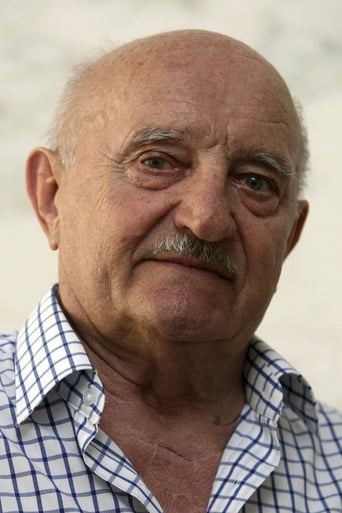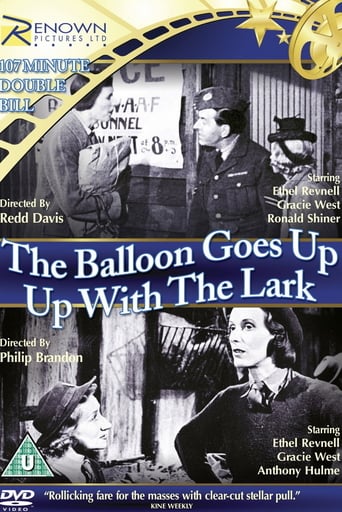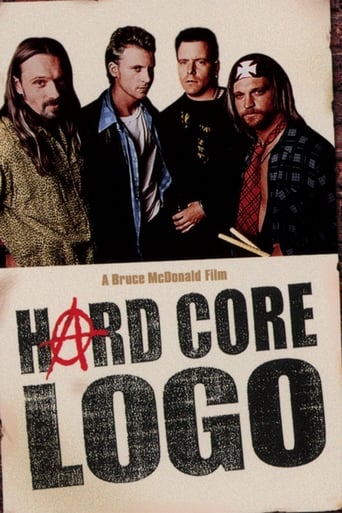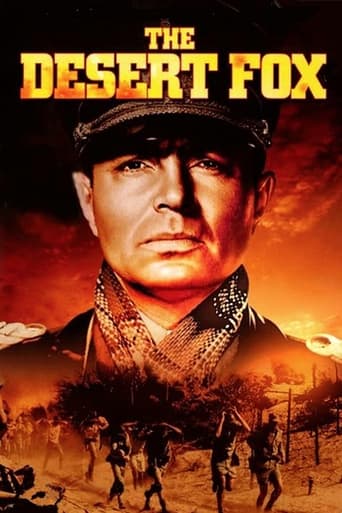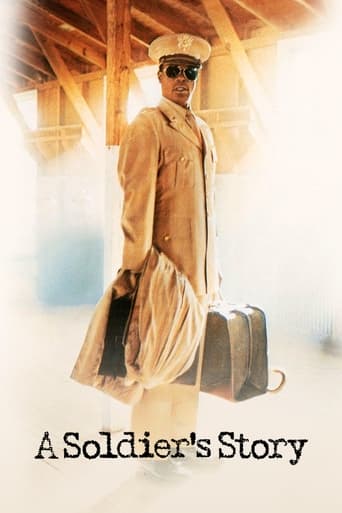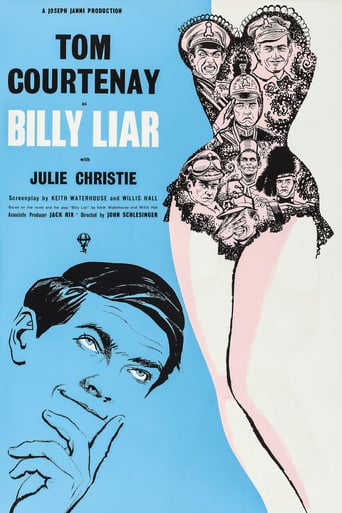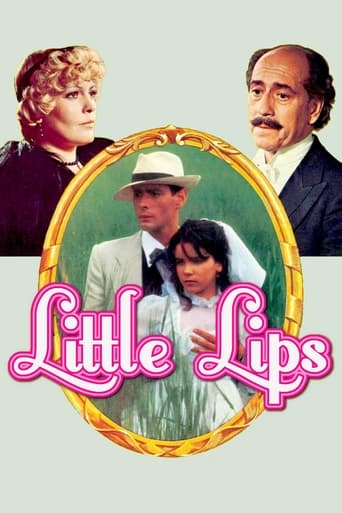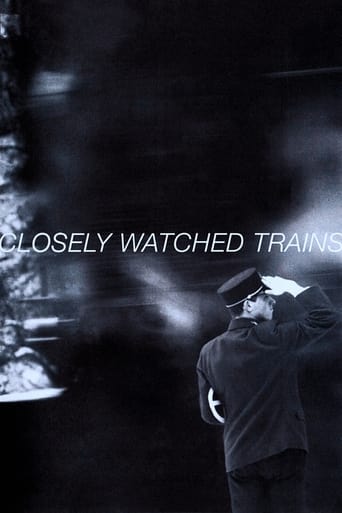
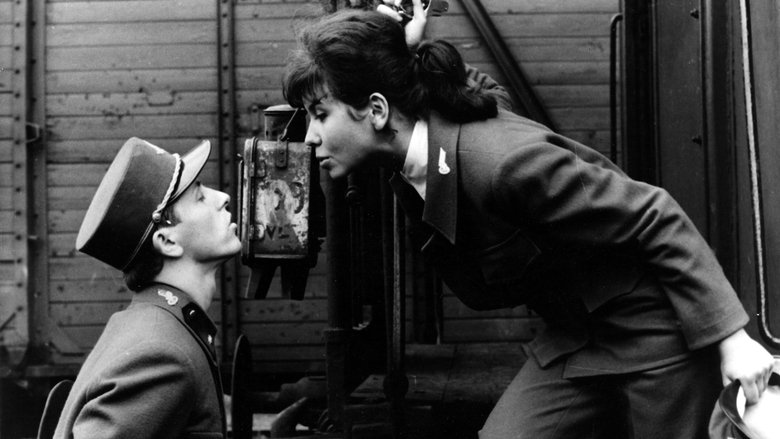
Closely Watched Trains (1967)
At a village railway station in occupied Czechoslovakia, a bumbling dispatcher’s apprentice longs to liberate himself from his virginity. Oblivious to the war and the resistance that surrounds him, this young man embarks on a journey of sexual awakening and self-discovery, encountering a universe of frustration, eroticism, and adventure within his sleepy backwater depot.
Watch Trailer
Cast


Similar titles
Reviews
Please don't spend money on this.
When a movie has you begging for it to end not even half way through it's pure crap. We've all seen this movie and this characters millions of times, nothing new in it. Don't waste your time.
By the time the dramatic fireworks start popping off, each one feels earned.
The best films of this genre always show a path and provide a takeaway for being a better person.
CLOSELY WATCHED TRAINS is a comedy drama, in which, the paradox of a point is included in the title. This is a reference to a shy youth, social and political turmoil, while arrogant trains of life passing by. The film is based on a 1965 novel by Bohumil Hrabal.The young Milo Hrma, who speaks with misplaced pride of his family of misfits and malingerers, is engaged as a newly trained station guard in a small railway station during the Second World War and the German occupation of Czechoslovakia. The stationmaster is passionate breeder of pigeons and rabbits. The train dispatcher Hubička is preoccupied with women. Milo holds an as-yet platonic love for the pretty, young conductor, but he is still a virgin. The Nazi-minded Zednicek periodically visits a train station. However, it seems that his propaganda has no effect on the station staff. Problems arise when Máa wants sex with Milo...It is a coming-of-age story about a nervous young man who is going through a kind of "sexual crisis" to a desperate knowledge. Mr. Menzel has showed a birth of a heroic act from an indifferent social environment and internal youthful anxiety. This is a charming and witty deflection from false problems.The atmosphere is very good, while the characterization is excellent. Some scenes are imaginative to tragicomic proportions. I would not characterize this film as a kind of ideological criticism. This is only a preview of a touching reality.Václav Neckář as Milo Hrma is a funny and tragic hero who constantly volunteers in a suicide mission. Josef Somr as train dispatcher Hubička is enough perverse, aware and sympathetic to one member of the resistance. Jitka Bendová as conductor Máa is girl who is full of understanding. Jitka Zelenohorská as telegraphist Zdenička has realized that the stamps can be very creative. Vladimír Valenta as stationmaster has understood that nothing can be black and white. Libue Havelková as stationmaster wife is a clever woman. Naďa Urbánková as Viktoria Freie is a kind of salvation, which, unfortunately, take a young life.
Sad, but funny; satirical, but not cynical; "Closely Watched Trains" is among the finest films to come out of the legendary Czech New Wave. Jam packed with roaringly hilarious scenes, this is a frank depiction of sexuality set during WWII, providing slyly comic commentary on both a young man's early confrontation with sex and the chaotic war surrounding him. With a cast of likable and interesting characters, this work is dominated by profound understanding of the protagonist's somewhat awkward encounters with an overly frightening and heavy concept. It will likely be relatable for many (I could certainly identify with the film to an extent), and through this relatability comes all of the comedy a viewer could possibly hope for.This is a brilliant and quick movie that may have moments of juvenile humor and seem like a mainstream flick that happens to be in black and white featuring subtitles, but it is also intelligent, satirical, poignant, profound, insightful, important, and genuinely funny.
The film "Watch the train" (Dutch title) tells the story of Milos, a young points-man, in Czlechoslovakia during the German occupation in the Second World War. The film combines a mild humor with a sketch of the Nazi's cruelty and stupidity. Milos starts to work in the railway station of his local village. He is hardly full-grown, and his personality is still fragile. His basic pre-occupation, and a source of self-doubt, is the opposite sex. His sexual performance becomes an existential problem for him, and even induces a suicide attempt, after an unsuccessful intercourse with his girlfriend, a train guard. Eventually the niece of a colleague helps him to overcome his fears. As such the narrative is rather thin. The real charm of the film is in the detail, int the little events, that accompany this main story. The stationmaster, who suffers under his dominant wife. The frivolous colleague of Milos. The apathetic German soldiers, who find comfort in a railway wagon filled with nurses. The photographer, who bursts into a gale of laughter, after his house is demolished by an air raid. And the crooked regional inspector, who is a dedicated but stupid and insensible supporter of Hitler and the army of occupation. In the wake of his successful intercourse, which proves his manhood, Milos sabotages and destroys a train filled with ammunition. Unfortunately this second success in his young life leads at the same time to his own destruction. On a higher level I don't know what to think of this narrative. It is not an invitation to reflect. Neither is it a tale of heroism, or a portrayal of existential emptiness. The events just unfold, as if by accident, and could just as well have taken a different turn. It brings some reminiscences of the Russian film Ballad of a Soldier, which in my opinion is a better appeal to our emotions. Both films probably simply mean to sketch the waste of promising lives as a result of the stupidity of war. It is probably this aspect of the possibilities for a happy future, which shows their Bolshevist background.
Imagine coming of age in a time when you are surrounded by sexual images. This Academy Award winning film can be the Czechoslovakian version of so many of the Judd Apatow films we see today.Brilliantly photographed in black and white, it shows Milos (Václav Neckár) trying to become a man. His first opportunity with his girlfriend Masa (Jitka Bendová) ends in disaster and he attempts suicide. His doctor advises him to get a more experienced woman to teach him, so he goes on a quest to find one.This all takes place during the Nazi occupation of Czechoslovakia, so there are many political overtones to the film. It is hilarious as Milos works at a train station where his coworker Hubicka (Josef Somr) doesn't seem to have problems getting action whenever he wants.He does manage to arrange help for Milos, but tragedy strikes before he is able to use his new found knowledge with his girlfriend.An excellent picture and a real funny story that manages to avoid the crudity of modern tales of the same sort.




